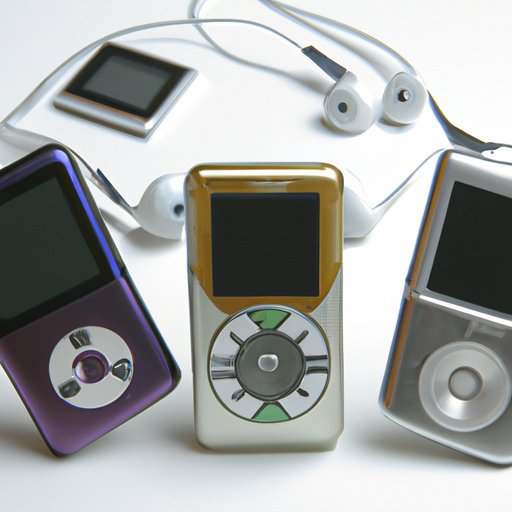Introduction
MP3 players are digital audio devices that can store and play audio files compressed in the MPEG-1 Audio Layer 3 (MP3) format. This format compresses an audio file without losing much quality and is commonly used for downloading and streaming music. The invention of the MP3 player has revolutionized the way we listen to music, and its influence can still be felt in today’s music industry.
In this article, we will explore the history of the invention and evolution of MP3 players, from their inception to their impact on modern music technology. We will look at how this device changed music history and explore the innovators behind the invention.

A Historical Look at the Invention of MP3 Players
The idea of the MP3 player first emerged in 1992 when Karlheinz Brandenburg, a German engineer working at the Fraunhofer Institute for Integrated Circuits in Erlangen, Germany, developed the MP3 compression algorithm. His work was based on the ISO/MPEG-1 standard, which was created in 1988 by the Motion Picture Experts Group (MPEG). Brandenburg’s invention allowed audio files to be compressed to a fraction of their original size without any significant loss in sound quality.
The first MP3 player was released in 1997 by South Korean electronics manufacturer Saehan Information Systems. The MPMan F10, as it was called, had 32MB of memory and could store up to 10 songs. It was followed by the release of the Rio PMP300, the world’s first commercially available portable MP3 player, in 1998. The Rio PMP300 was created by Diamond Multimedia, an American company that specialized in multimedia products.
The success of the Rio PMP300 sparked the development of other portable MP3 players, including the Creative NOMAD Jukebox in 2000, the Apple iPod in 2001, and the Microsoft Zune in 2006. By 2007, the MP3 player had become one of the most popular consumer electronics products in the world.

How the MP3 Player Changed Music History
The introduction of the MP3 player marked a turning point in the history of music technology. Prior to the emergence of the MP3 player, music was primarily consumed through physical formats such as vinyl records and cassette tapes. The invention of the MP3 player made it possible to easily store, transfer, and play large collections of digital music files.
Furthermore, the MP3 player enabled users to access and download music from online music stores, eliminating the need to purchase physical copies of albums. This gave rise to the concept of online music streaming and downloading, which has since become the primary way people consume music today.
“The MP3 player was a major breakthrough in the music industry,” says Michael Robinson, Professor of Music Technology at the University of California, Berkeley. “It allowed people to access music anywhere, anytime, and made music more accessible than ever before.”
Exploring the Evolution of Music Technology Through the Invention of MP3 Players
The invention of the MP3 player also paved the way for the development of other digital music technologies, such as online music streaming services, digital music downloads, and digital music players. These technologies have continued to evolve over the years, with new innovations such as cloud storage and artificial intelligence-based music recommendation systems being introduced.
The MP3 player has also had a profound impact on how musicians create and distribute their music. With the advent of digital music production software, musicians no longer need expensive recording studios to produce their music. They can now record and mix their own music using computers, making it easier and cheaper to produce professional-sounding recordings.
Additionally, the internet and social media platforms have made it easier for musicians to promote and distribute their music, allowing them to reach a wider audience and build a fan base more quickly.
Conclusion
The invention of the MP3 player revolutionized the way we listen to music, and its influence can still be felt in today’s music industry. It enabled users to access and download music from online music stores, eliminating the need to purchase physical copies of albums. Furthermore, it paved the way for the development of other digital music technologies, such as online music streaming services, digital music downloads, and digital music players.
The MP3 player has also had a profound impact on how musicians create and distribute their music. With the advent of digital music production software, musicians no longer need expensive recording studios to produce their music. Additionally, the internet and social media platforms have made it easier for musicians to promote and distribute their music.
In conclusion, the invention of the MP3 player has been instrumental in transforming the way we listen to music and how musicians create and distribute their work.
(Note: Is this article not meeting your expectations? Do you have knowledge or insights to share? Unlock new opportunities and expand your reach by joining our authors team. Click Registration to join us and share your expertise with our readers.)
